2020年新人教版高中英语必修一教案全套
人教版高中英语必修1教案5篇
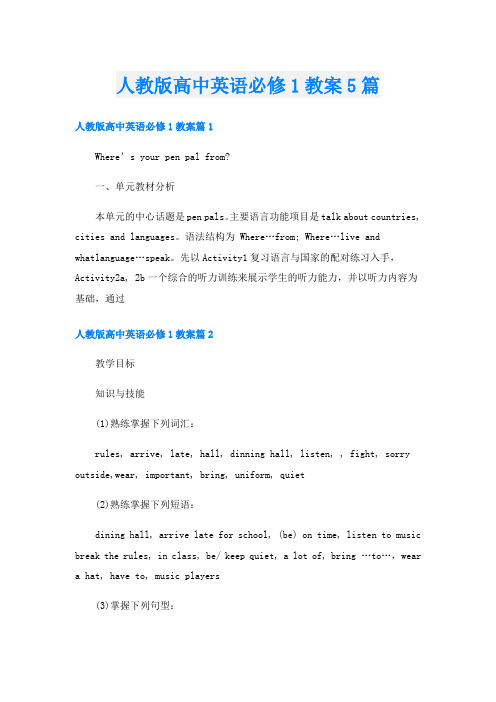
人教版高中英语必修1教案5篇人教版高中英语必修1教案篇1Where’s your pen pal from?一、单元教材分析本单元的中心话题是pen pals。
主要语言功能项目是talk about countries, cities and languages。
语法结构为 Where…from; Where…live and whatlanguage…speak。
先以Activity1复习语言与国家的配对练习入手,Activity2a, 2b一个综合的听力训练来展示学生的听力能力,并以听力内容为基础,通过人教版高中英语必修1教案篇2教学目标知识与技能(1)熟练掌握下列词汇:rules, arrive, late, hall, dinning hall, listen, , fight, sorry outside,wear, important, bring, uniform, quiet(2)熟练掌握下列短语:dining hall, arrive late for school, (be) on time, listen to music break the rules, in class, be/ keep quiet, a lot of, bring …to…,weara hat, have to, music players(3)掌握下列句型:1. Dont eat in class.2. You must be on time.3. Eat in the dining hall.4. 正确使用情态动词can, can’t——Can we wear a hat in school?——Yes, we can./No, we can’t.5. 能正确使用have to 和 must 谈论规章制度We must be on time/ We also have to be quiet in the library. 教学重难点重点:1) 肯定祈使句是省略掉主语的原形动词开头;2) 否定祈使句则是在肯定祈使句前加上“don’t”。
人教必修一英语教案(3篇)

第1篇教学目标:1. 理解和掌握本节课的核心词汇和短语。
2. 提高学生的听、说、读、写能力。
3. 培养学生的英语学习兴趣,提高英语综合素质。
教学内容:1. 词汇:family, friend, school, teacher, student, home, class, subject, etc.2. 短语:be good at, have fun, study hard, make friends, etc.3. 句型:What's your name? How old are you? What do you do? etc.教学步骤:一、导入1. 教师通过图片、视频或实物展示家庭、学校、朋友等场景,引导学生思考相关话题。
2. 提问:What's your family like? Who are your friends? What do you do at school?二、词汇教学1. 教师通过PPT展示本节课的核心词汇,如family, friend, school, teacher, student, home, class, subject等。
2. 学生跟读,教师纠正发音。
3. 教师用例句展示词汇的用法,如:My family is big. I have two brothers and a sister. (我的家庭很大,我有两个兄弟和一个妹妹。
)三、短语教学1. 教师展示本节课的核心短语,如be good at, have fun, study hard, make friends等。
2. 学生跟读,教师纠正发音。
3. 教师用例句展示短语的用法,如:I am good at English. (我擅长英语。
)四、句型教学1. 教师展示本节课的核心句型,如What's your name? How old are you? What do you do?等。
2020版英语新教材人教必修一同步教案1.1
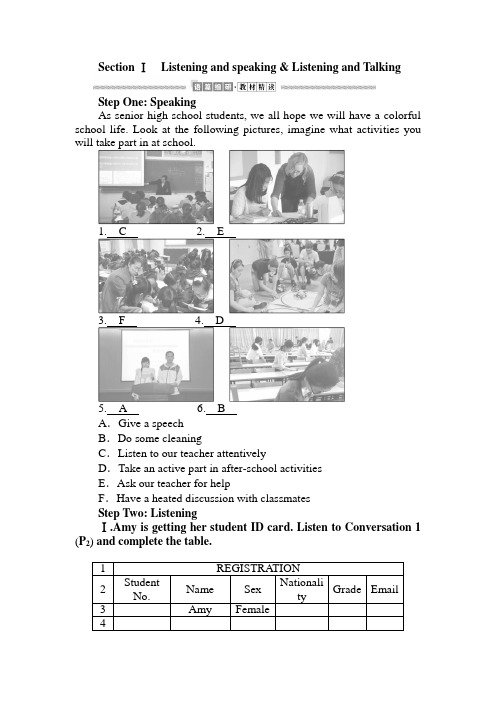
Section ⅠListening and speaking & Listening and TalkingStep One: SpeakingAs senior high school students, we all hope we will have a colorful school life. Look at the following pictures, imagine what activities you will take part in at school.1.C2.E3.F4.D5.A6.BA.Give a speechB.Do some cleaningC.Listen to our teacher attentivelyD.Take an active part in after-school activitiesE.Ask our teacher for helpF.Have a heated discussion with classmatesStep Two: ListeningⅠ.Amy is getting her student ID card. Listen to Conversation 1 (P2) and complete the table.1 REGISTRATION2 StudentNo.Name SexNationalityGrade Email3 Amy Female 4M:I'm good. Let's go and sit down.[They walk to a table.]A:What do you think about senior high school?M:So far, so good, Amy. I've had maths and English this morning. The maths class is getting more difficult but it's really interesting. It's my favourite class so far. How about you?A:I think science is more fun. Chemistry's my favourite.Ⅲ.Amy is talking to Ms Li, a school adviser, about which courses to choose. Listen to Conversation 3 (P2)and answer the questions.1.What does Amy want to be in the future?A.An engineer. B.A designer.C.A writer.答案:B2.What course will Amy probably choose?A.English B.ITC.Art答案:C听力材料:COVERSATION 3A=Amy L=Ms. Li[In the adviser's room.]A:Good morning, Ms. Li.L:Morning, Amy. How are you doing?A:Very well, thank you. Ms. Li, I want to be a designer in the future, so what courses do you think I should choose?L:Oh, interesting! Well, first of all, I think an art course would be helpful to you. And there are some other courses...[Fade out.]Ⅳ.根据录音在空格处填入合适的内容Listen to the following passage and then fill in the blanks.My name is Li Kang, a student of Guang Ming Middle School. I live in a city 1.not_far_from Beijing. Today is my first day at Senior High School. Everything in the school 2.leaves_me_a_deep_impression. The classroom is big and abroad, which 3.has_a_computer with a special screen behind it. The teachers are not only 4.friendly but also enthusiastic. My English teacher's teaching method is pletely_different_from that of the teachers' at Junior High School. During his class, my classmates and I introduced ourselves to each other, and did some 6.spelling games. There are three times as many girls as boys in the classand we all work very hard.话题积累:(1)be completely different from 完全不同于(2)introduce oneself 自我介绍(3)There are three times as many girls as boys in the class...这个班女生的人数是男生的三倍……Step Three: DiscussionSenior high school is a new start for us students and is of great importance. As a student, how would you plan to enjoy a colorful school life?Suggestions:(1)I will read widely to get more knowledge and broaden our view.(2)As far as I'm concerned, I will place my study before the other things.(3)I will take part in all kinds of after-class activities, which will broaden our view, enrich the school life and make me relaxed.(4)I_will_get_along_well_with_my_classmates_and_learn_all_my_s ubjects_well_as_well.Step Four:国际音标毋庸置疑,音标是学习英语的基础,学好音标能够使英语发音更准确,这对词汇的背诵积累尤其重要。
2020版英语新教材人教必修一同步学案:2.1Section+Ⅰ和答案

2020 版英语新教材人教必修一起步教案: 2.1Section+Ⅰ和答案Section ⅠListening and speaking & Listening and TalkingStep One: Speaking1.What clubs have you ever joined?Ballet_club;_Nature_Club;_Volunteer_Club;_Debate_Club2.We have different hobbies in our daily life. What do you think students do in these clubs? Match the pictures with the names of the clubs.Ballet club: 2Nature Club: 4Volunteer Club: 3Debate Club: 1Step Two: ListeningⅠ.Listen to the first two conversations and choose the correct answers(.课文 P12)1.What are they learning about in Conversation 1?A.Hearing B.SoundsC.Dogs答案: A2.The students are discussing ________ in Conversation 2.A.schoolwork B.relationshipsC.dating答案: C3.Circle the two clubs where these two conversation happened.A.Science Club B.Ballet ClubC.Nature Club D .Debate Club答案: AD2020 版英语新教材人教必修一起步教案: 2.1Section+Ⅰ和答案听力资料:COVERSATION 1T=Teacher S=StudentT:Shh! Listen carefully![3-second beep at about 40 kHz, i.e. ultrasonic, dog -whistle range.]T:Did you hear that? No? How about this?[3-second beep at 17.4 kHz.]T:If you couldn't hear the first one, it means you're not a dog![laugh] . Dogs can hear very high frequency sounds, but people can't. And if you could hear the second one, you're younger than 25.S:Wow! Why is that?T:Our ears change when we get older. Children and young people can hear the second one, but most people older than 25 can't.COVERSATION 2T=Teacher A=Team A B=Team BT:Today's topic is “Should teenagers date?” Team A, please begin.A:We say no, they shouldn't. One reason is that teenagers are too young. They should think about schoolwork and spend more time studying.B:We don't agree with Team A. Our answer is “Yes”. Teenagers can date if they want. It is quite natural for a teenager at that age to feel he or she likes somebody. We think it's possible for teenagers to date and study at the same time.T:Team A? ...Ⅱ.Listen to Conversation 3. Then help Adam choose a club.1.Tick the activities that happen in each club.课(文 P12)Ballet Club Nature Club①l earn new movements ①listen to lectures②watch dance programmes ② grow plants③make ballet clothes ③work in a greenhouseCartoon Club Volunteer Club①watch cartoons①help old people②w rite stories ②clean up the parks③draw cartoons ③give directions答案: Ballet Club: ①Nature Club: ②③Cartoon Club: ②③Volunteer Club: ②③2.Adam says that he likes ________ but is not so interested in________.A.stories, cartoons B.animals, plantsC.making friends, cleaning up答案: B3.Which club do you think is suitable for Adam? Why?I think Adam should join the ________ Club because he says that he ________.答案: Volunteer; likes to do somethingoutdoors 听力资料:COVERSATION 3J=Julie A=AdamJ:Hi, Adam! Are you going to join a club?A:Hi, Julie! I'd like to, but I'm not sure which one.J:I think I will join the Ballet Club. It's always been my dream to be a dancer, and ballet has such beautiful movements.A:Oh, wow, dancing's not for me — I've got two left feet! Mr. Brown told me about the Nature Club. They watch biology lectures and grow plants in a greenhouse. I like animals, but I'm not so interested in plants.J:Did you hear about the Cartoon Club?A:Yes, I love cartoons! But what do they do in the club? Watch cartoons?J:No, they write stories and draw cartoons.A:Oh, no. I'm not good at drawing. Besides, I'd like to do something outdoors.J:Max is in the Volunteer Club. He says that they mostly help clean up parks and give directions to visitors. Why not talk to him?...Listening Tips1.展望内容Before you listen, you can read the questions and the choices. It will help you to predict what you will hear. For example, from Question 1's choices, we can find A and B are similar, which is important. During you listening, when you hear “Did you hear that ?”“If you couldn't hear the first one if you could hear the second one” “Our ear changes when...”, you may know the answer is A.2.巧听爆破音(1)爆破音+爆破音: 6 个爆破音【 t、d、k、g、p、b】中的随意 2 个相邻时,前一个爆破音会失掉爆破,即由有关的发音器官做好这个发音的姿势,稍做停留后即发后边的爆破音。
2020年新人教版高中英语必修一导学案全套
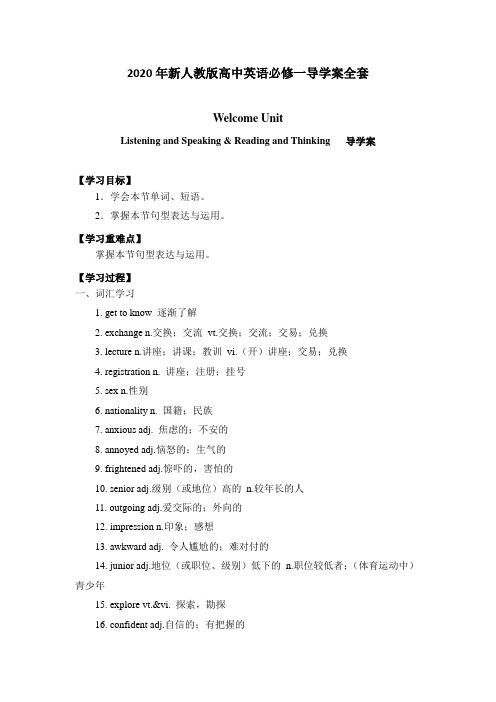
2020年新人教版高中英语必修一导学案全套Welcome UnitListening and Speaking & Reading and Thinking 导学案【学习目标】1.学会本节单词、短语。
2.掌握本节句型表达与运用。
【学习重难点】掌握本节句型表达与运用。
【学习过程】一、词汇学习1. get to know 逐渐了解2. exchange n.交换;交流vt.交换;交流;交易;兑换3. lecture n.讲座;讲课;教训vi.(开)讲座;交易;兑换4. registration n. 讲座;注册;挂号5. sex n.性别6. nationality n. 国籍;民族7. anxious adj. 焦虑的;不安的8. annoyed adj.恼怒的;生气的9. frightened adj.惊吓的,害怕的10. senior adj.级别(或地位)高的n.较年长的人11. outgoing adj.爱交际的;外向的12. impression n.印象;感想13. awkward adj. 令人尴尬的;难对付的14. junior adj.地位(或职位、级别)低下的n.职位较低者;(体育运动中)青少年15. explore vt.&vi. 探索,勘探16. confident adj.自信的;有把握的17. designer n. 设计师;构思者二、知识运用1. exchange词性:________ 意思:__________词性:________ 意思:__________短语搭配:in exchange (for......)作为(与.......的)交换exchange A for B 以A交换B;把A兑换成Bexchange sth. with sb. 与某人交流/交换某物exchange opinion/ideas/views 交流意见/想法/看法练习:The School of Life has a large number of professional staff who are willing to meet up with you for an hour of chat in exchange ______ a small fee.2. designer(1)词性:_________ 意思:________(2)词性:_________ 意思:________短语搭配:make designs for.....为......做设计by design(=on purpose)故意地design sth. for.......为......设计某物be designer to do.......旨在做.......,用于做........练习:Lucy was born on January 30th, 1998, when her sister got married to a fashion_____(design).3. anxious词性:__________ 意思:________短语搭配:be anxious for sb./about sth. 为某人/某事担心/担忧be anxious for......渴望........be anxious (for sth.) to do sth. 渴望(某人)做某事be anxious that.......渴望(从句谓语用“should + 动词原形”,should 可以省略)练习:She lost her job last month. Therefore, she is anxious_______ (find) a new job.4. annoyed词性:__________ 意思:_________短语搭配:be annoyed with 生某人的气be annoyed at/about sth.因某事生气be annoyed to do 做.......感到生气练习:_______(使我心烦的是)I didn’t have time t o do more reading.5. senior词性:__________ 意思:___________词性:__________ 意思:___________短语搭配: senior high (school)高中be senior to sb. 比某人的地位/职位高练习:My father is my senior _____three years.6. impression词性:__________ 意思:____________短语搭配: have a(n).....impression of.....对.....有......印象leave/make a(n) .......impression on sb.给某人留下.......印象(be)under the impression that......以为.....,(通常指)误认为.......拓展:be impressed with/by sth. 对某事印象深刻;被某事感动impress sth. on sb. 使某人牢记某事be impressed on one’s mi nd/memory 印入某人脑海/记忆中练习:Williams was impressed _______ Benjamin and gave him two classic books on painting to take home.7. confident词性:___________ 意思:____________短语搭配:be confident about对......有信心be confident of (doing) sth. 对(做)......有把握be confident that......确信......拓展:lack of confidence 缺乏自信with confidence 有把握have confidence in......对......有信心have confidence to do sth.有信心做某事。
人教版高中英语必修一全册教案设计
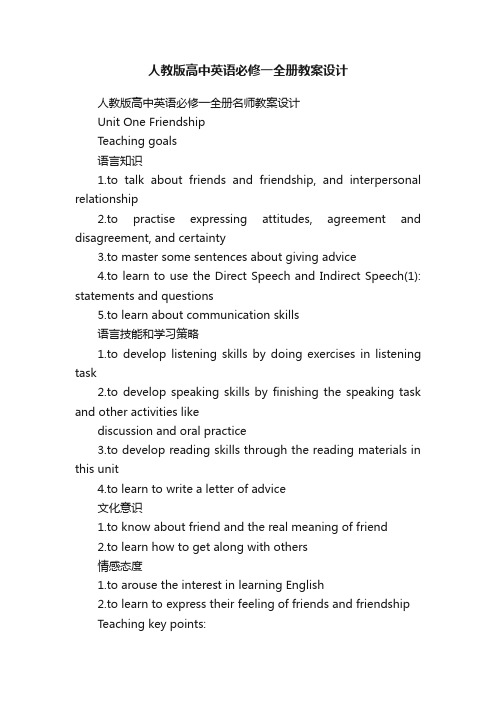
人教版高中英语必修一全册教案设计人教版高中英语必修一全册名师教案设计Unit One FriendshipTeaching goals语言知识1.to talk about friends and friendship, and interpersonal relationship2.to practise expressing attitudes, agreement and disagreement, and certainty3.to master some sentences about giving advice4.to learn to use the Direct Speech and Indirect Speech(1): statements and questions5.to learn about communication skills语言技能和学习策略1.to develop listening skills by doing exercises in listening task2.to develop speaking skills by finishing the speaking task and other activities likediscussion and oral practice3.to develop reading skills through the reading materials in this unit4.to learn to write a letter of advice文化意识1.to know about friend and the real meaning of friend2.to learn how to get along with others情感态度1.to arouse the interest in learning English2.to learn to express their feeling of friends and friendshipTeaching key points:1.how to improve students’ speaking and cooperating abilities2.learn to use the Direct Speech and Indirect Speech(1):statements and questions3.master some words and expressionsTeaching difficult points:1.train the students’ speaking, listening, reading and writing abilities2.how to improve students’ cooperating abilitiesTeaching methods:Student-focus approach and task-based approachLearning methods:Cooperative studyTeaching aids:Computer词汇教学:1. survey n. 调查;测验;测量;检查;鉴定They were pleased with their wild survey of his work.他们广泛审查了他的工作,很满意。
人教版高中英语必修1全部教案设计
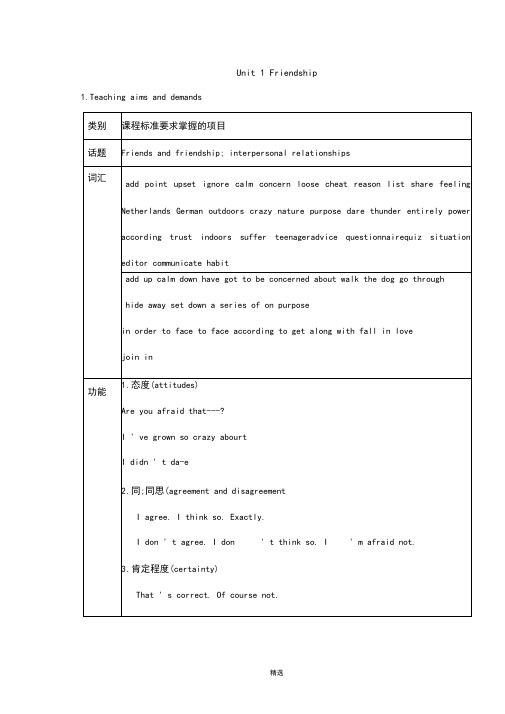
Unit 1 Friendship 1.Teaching aims and demands语法直接引语和间接引语(1):陈述句和疑问句陈述句“I don ' want to set down a series of facts in a diary.Said Anne.-- Anne said that shedidn ' Want to set down a series of facts in a diary.一般疑问句He asked Are you leaving tonigh?”---He asked us whether we were leaving that night.特殊疑问句“ When did you go to b edast nigh?” fathe said to Anne.---Father asked Anne when she went to bed the night before.1)Suggested teaching notes2). Analyses of the teaching contentsThis unit is about friendship, and nearly all the teaching materials center on it.Warming up---The questionnaire leads students to think and talk about friendship, get to know the problems between friends and seek solutions, which makes preparations forthe further teaching in topics, background and vocabulary.Pre-reading---The questions prompt students to think critically about friends and friendship in reality, alerting them to the fact that besides people, a diary can be afriend, too.Reading--- The diary by the Jewish girl Anne gave a glimpse of her life during her family ' s shelter in Amsterdam from the GermanNazis ’ lkliing in world war 2. she treats the diary as her best friend, and init revealsher longing for a normal life and close contact with nature, which helpsher get through the days.Comprehending---It helps students further understand the text by doing multiple choices, questions and answers, and matching.Learning about language---It teaches the important expressionsand structures andgrammar: direct and indirect speeches.Using language---The two letters, listening, questionnaire design, letter writing and fun writing prepares students to further talk about friendship, especiallythe problems with misunderstanding, and unfriendliness, thusstrengthening students ’ abilities to practice language, discover, and solveproblems.Summing up---It summarizes the whole contents of this unit from the aspects of topics, vocabulary and grammar.Learning tip--- This part encourages students to form the habit of writing a diary.Integrating skills--- The text introduces the way Hawaiians express friendship, to get students to realize the cultural differences in the values of friendship in additionits importance in all cultures.3)Making of the teaching planThis unit centers on friends and friendship, exploring different types of friendshipwith particular attention to that one can develop with oneself, i.e., the comfort andsupport one seeks from an imaginary friend. Students are expected to come to be trulyaware of the qualities and conducts that make a good friend, display and develop the ability to cope with misunderstanding, conflicts and problems related to friendship, and give advice on it. The concept that even an ordinary thing can be a friend should break down the traditional belief in the interpersonal nature of friendship. Also, the comparison of similarities dissimilarities in friendship comprehension between the East and the West leads students to know better the values of friendship in Westerns eyes. All in all, this unit promises to unveil the true essence of friendship and helps students to lead a more friendly and harmonious life. Thus, based on the theme, contents and teaching objectives, the whole teaching procedures can fall into five periods as follows:4)Teaching plans for each periodPeriod 1 Warming-up and Speaking1.Teaching objectives:1)Target languageI (don ' t) think ...... I (don ' t) think so. I (don ' t) agree.I believe ............. That ' s correct. In my opinion, ••2)Ability goalsa.Describe your friends in Englishb.Figure out the problems between friends and then find different ways to solve theproblems.3)Learning ability goalsa.To encourage students to think and talk about friends and friendship by using somephrases and structures.b.To learn to solve problems that may occur between friends.c.To cultivate the students to form the good habit of learning English in Senior MiddleSchool.2.Teaching important points:e the given adjectives and sentence structures to describe one of your friends.b.Learn to evaluate friends and friendship.3.Teaching difficult points:a.Work together with partners and describe one of your good friends.b.Discuss with partners and find out ways to solve the problems.4.Teaching methodsa.Task-based teaching and learningb.Cooperative learningc.Discussion5.Teaching aids:CAI6.Teaching procedures and ways:Step 1 Lead-in and Warming-upBefore the lesson, the teacher can arousethe students ’interests by showing a video of Auld Lang Syne.At the beginning of the first class, we can get the students to talk about their summer holidays. The students can talk freely as they like.1.How did you spend your summer holidays? How did you feel? What did you do inyour summer holidays? What did you do in your spare time?2.What do you think of our new school? Do you like it? Could you say somethingabout it?3.Do you like making friends? How do get in touch with your friends? Do you havemany friends? Where are they now? Do you have any old friends in our school?Have you made any new friends in our class?Step 2 Think it over1.Give a brief description of one of your friends. The following phrases and structuresmay be helpful:His/Her name is .........He /She is ....... years old.He / She likes ....... and dislikes .......He /She enjoys ......... and hates .....He /She is very kind/friendly/ ...When /Where we got to know each other.2.What types of friendship do you have?Pleasetick them out. Then fill in the blanks.girl friends boy friends pen friendslong -distance friends friends of the same agee-friends (friends over the internet) friends across generations unusual friends like animals, books ...1). _____is /are most important to you.2). You spend most of your free time with .3). You will share your secrets with .4). When in trouble, you will first turn to .Step 3 Make a survey1. List some qualities of a good friend or your ideal friend. Have the students get into groups of four to find out what each has listed.Tell your partner your standards of good friends by using the following structure:I think a good friend should (not) be ...In my opinion, a good friend is someone who ...1.Have a member of each group report on what their lists have in common and list them on theboard.2.Ask the class whether or not they agree with all the qualities listed.3.Then have the students do the survey in the textbook.4.Have the students score their survey according to the scoring sheet on page 8.5.The teacher ask some students how many points they got for the survey and assesstheir values of friendship:★4~7 points: You are not a good friend. You either neglect your friendor just do what he/she wants you to do. You should think more about what a good friend needsto do.★8~12 points: You are a good friend but you sometimeslet your friendship become too important, or you fail to show enough concern for your friend feelings. Try to strike a balance between your friend ' needs and your own responsibilities.★13+ points: You are an excellent friend who recognizes that to be a good friend you need balance your needs and your friend ' s. Well done.(You may also show your students the results above and let themselves self-reflect upon their own values of friendship)Step 4 Talking and sharing (work in pairs)1.If your best friend does something wrong, what will you do?Try to use the following phrases:I (don ' t) think ...... I (don ' t) think so.I (don ' t) agree. I believe ............That ' s correct. In my opinion, ........2.A British newspaper once offered a prize for the best definition(义)of a friend. If youwere the editor, choose the best one from the following entries保目),and explain why.One who understands my silence.A friend in need is a friend indeed.Friends are just the people who share your happiness and sorrow. When you look at your watch at 4 am, but still know you can call them and wake them up, and they still want to talk to you, that friendship. To' have a friend, you need to be a good friend.Step 5 Group work (output)The teacher can give each group one of these questions below to talk about. Then let the class sharetheir ideas. It ' better to stimulate the students to expresstheir own opinions about these questions.1.Do you think it is a good idea to borrow money from your friend?Why and Why not?2.What factors may cause the breakdown of a good friendship?3.What can be your unusual friend besides human beings? And why?Step 6 Homework1.Write down a short passage about your ideas /the factors/your unusual friends.2.Prepare for the new lesson.Period 2 Reading Anne ’ s Best Friend1.Teaching objectives:1)To develop the students r’ eading ability, learn to use some reading strategies such asguessing, key sentences, skimming and so on;2). To get the students to realize the importance of friends and friendship, and to telltrue friends from false friends;3). To grasp some useful words and expressions in this passage, such as on purpose, be crazyabout etc.;4). To learn the writing style of this passage.2.Teaching method: Task-based teaching3). Teaching procedure:Step 1.Pre-reading1.Please enjoy three pieces of music and find out what they are about.2..Why do you think friends are important to you?3.What do you think a good friend should be like? List the good qualities a good friendshould have.4.Have you ever considered making friends with animals, plants or even an object?Why or why not?Step 2.Reading1.Try to guess what Anne ’ s friend is and what the passage is about by reading the titleand having a quick at the pictures in this passage without reading it.2.Skimming the first two paragraphs to confirm your guessing.1)What was Anne ’ s best friend? Why did she make friends with it?2)Did she have any other true friends then? Why?3)What is the difference between Anne ’ s diary and those of most people?4)Do you keep a diary? What do you think most people set down in their diaries?5)We are going to read one of Anne ’ s diaries .but before reading ,can you tell me what the diary is about with the help of one key sentence in the 2nd paragraph?3.Reading of Anne ’ s diaryHow she felt in the hiding placeTwo examples to show her feelings thenStep 3.Post-reading1.What would you miss most if you went into hiding like Anne and her family? Giveyour reasons.2.Group workWork in groups to decide what you would do if your family were going to be killedjust because they did something the Emperor did not like.Where would you plan to hide?How would you arrange to get food given to you every day?What would you do to pass the time?3.Discovering useful words and expressionsComplete the following sentences, using words and expressions from Reading1)She has grown ________ about computer games.2)Was it an accident or did David do it on ___ ?3)From the beginning ,Paul made it clear that he would be ____ (完全地)incontrol.4)He used to work ______ even in the middle of winter.5)Just the _____ of more food made her feel sick.6)You had better have a ________ talk with him.7)Born in a poor family, the manager _______ lots of hardships in his childhood.8)A diary is often kept to _____ what happenins people ’ s daily lives.Step 4.Talking about friends and friendship1.T here are many proverbs about friends and friendship. Choose the one you agree with and explain why, then choose one you disagree with and explain why.A friend in need is a friend indeed.Friends are like wine; the older, the better.A friend to all is a friend to none.The same man cannot be both friend and flatterer僦奉承者).False friends are worse than open enemies.Walking with a friend in the dark is better than walking alone in the light.2.W e have talked about friends and friendship today, can you write one or two sentences to express your understanding of friends and friendship.Step 5.Homework:1.I nterview a high school student, a businessman, a police officer and a housewife to findout their opinions about friends and friendship. Write a report to share itwith the whole class.2.Describe one of your best friends following the writing style of this passage.Ending: Let ’ s sing this song about friends togetherPeriod 3 Grammar1..Teaching objectivesLearn to use direct speech and indirect speech2.Teaching important pointSummarize the rules of Direct Speech and Indirect Speech.3.Teaching difficult pointLearn about the special cases in which the tenses shouldn ed. ’ t be chang4.Teaching methodsDiscussing, summarizing and practicing.5.Teaching proceduresStep1 Lead inT: In the last lesson, we learned Anne Frank ’ s story. She is telling herstories to twher friends—you and Tom. Tom has something wrong with his ears, so you have to repeat Anne ’ s sentences, using indirect speech. Sometimes you explain Tom sentences to Anne.“I have to stay in the hiding place." said Anne. —Anne said she had to stay in the hiding place.“ Do you feel sad when you are not able to go outdoors? ” Tom asked Anne.Tom asked Anne if/whether she felt sad when she was not able to go outdoors.I don ’ t want to set down a series of facts in a diary, said Anne.Anne said that she didn ’ t want to set down a series of facts in a diary.“What do you call your diary?” Tom asked. —Tom asked what she called her diary.Ss go on this topic by themselves.Step 2 GrammarT: Now let ’ s look at these sentences again. If we want to change Direct Speech into Indirect Speech, what should be changed?Ss discuss by themselves.Ss: sentence structures, tenses, pronouns, adverbials of time and place and verbs should be changed.T: Quite right. Look at the form on the screen. These are the rules.直接引语变成间接引语时,要注意以下几点:人称变化、时态变化、宾语从句要用陈述句语序。
2020年人教版高中英语必修一《Unit 1 Teenage Life 》单元课件全套
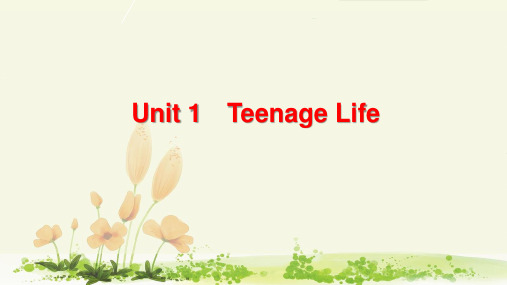
Listening and Speaking & Reading and Thinking—Pre-reading
PART 1 读前清障 PART 2 课文理解思 [第一组]
1.teenage 2.volunteer 3.debate 4.prefer 5.topic
A.Because he was short.
B.Because he had too many things to do.
√C.Because he didn’t play well enough.
D.Because he didn’t play hard.
4.What does the phrase “advanced course” refer to in the last paragraph?
Ⅱ.Choose the best answer. 1.According to the text,what are the author’s challenges? A.Choose suitable courses. B.Choose extra-curricular activities. C.Study harder than before.
B.Clever and careful.
C.Kind and warm-hearted.
D.Cool and helpful.
Step 3 Post-reading
After reading the passage,please fill in the following blanks. Adam is a freshman at senior high school.He is faced with many 1.__c_h_a_ll_e_n_g_e_s (challenge) at this time.At first,he didn’t know which courses 2.___t_o_c_h_o_o_s_e_ (choose),but his adviser helped him solve this problem.Though he chose Chinese,he thought 3. it was very difficult and hoped to be 4. fluent (fluency) when he graduated.His adviser also recommended that he 5. (should) sign (sign) up for 6.advanced(advance) literature.In addition,he wanted to join the school football team but 7. was refused (refuse),8. which made him unhappy.He didn’t give up and decided to find a way to improve on his own and make the team next year.
人教版高中英语必修一全册完整教案
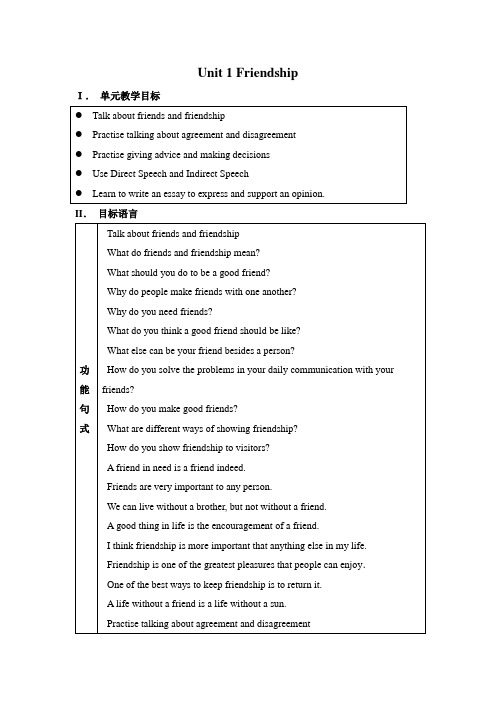
Unit 1 Friendship I.单元教学目标II.目标语言III. 教材分析和教材重组1. 教材分析本单元以Friend和Friendship为话题,旨在通过单元教学使学生通过讨论什么是好朋友,什么是真正的友谊,如何交友和保持友谊等问题,使学生树立正确的交友观。
并针对日常交友过程中经常遇到的实际问题,指导学生发表自己的见解和看法,通过进一步讨论提供有效的解决方案。
并能就此以编辑的身份写出指导信,对相关谚语写出观点明确、论证有力的短文。
1.1 Warming Up以调查问卷的形式,通过对学生在日常交友过程中所遇到的五个问题,展开调查,使学生对是否擅长交友做出评价,激发学生对本单元的中心话题产生兴趣;同时也使教师本单元的授课更具有针对性,从而有效地帮助学生树立正确的交友观。
1.2 Pre-Reading通过四个问题引导学生讨论交友的重要性以及自己心目中好朋友的概念和标准,并使学生认识到不仅人与人,人与物(如日记)也可以成为好朋友。
继续探究并树立正确交友观,并为阅读作好了准备。
1.3 Reading讲述第二次世界大战的纳粹统治时期,犹太人Anne一家过着滇沛流漓,与世隔绝的生活。
Anne在孤独中只能以日记Kitty 为友,倾诉衷肠,伴其渡过两年的逃亡生涯。
控诉了纳粹党的残暴统治给犹太人民带来了深重的灾难,并以日记的形式表达了以主人公Anne为代表的全世界人民憎恨战争渴望和平的共同心愿。
学生学习了新的词汇、句型,提高了阅读水平。
文中选用了主人公的一篇日记,使学生进一步感受到了挚友的可贵,对主人公内心世界的描写有了更深刻的理解。
1.4 Comprehension 设计了三种题型。
其中前两个是考查学生对READING文章细节内容的理解,最后一题是开放性问题,学生可以在更深入理解主人公内心世界的基础上各抒己见,使学生养成勤于思考勇于探究的良好的学习习惯,现时也培养了学生的想象力,进一步提高了阅读水平。
2020学年新教材高中英语UNIT1TeenagelifeSectionⅤWriting教案新人教

2019-2020学年新教材高中英语UNIT 1 Teenage life Section ⅤWriting教案新人教版必修第一册编辑整理:尊敬的读者朋友们:这里是精品文档编辑中心,本文档内容是由我和我的同事精心编辑整理后发布的,发布之前我们对文中内容进行仔细校对,但是难免会有疏漏的地方,但是任然希望(2019-2020学年新教材高中英语UNIT 1 Teenage life Section ⅤWriting教案新人教版必修第一册)的内容能够给您的工作和学习带来便利。
同时也真诚的希望收到您的建议和反馈,这将是我们进步的源泉,前进的动力。
本文可编辑可修改,如果觉得对您有帮助请收藏以便随时查阅,最后祝您生活愉快业绩进步,以下为2019-2020学年新教材高中英语UNIT 1 Teenage life Section ⅤWriting教案新人教版必修第一册的全部内容。
Section ⅤWriting建议信错误!文体感知建议信是向收信人就某事提出自己的建议或忠告的一种文体。
写信时要写明写信的原因、建议的内容、提出建议的理由,提出的理由要合情合理,语气一定要委婉和缓。
错误!增分佳句1.常用的开头语①I know you are now having trouble communicating with others,and you may often feel lonely.我知道你现在在与人交流方面有些麻烦,你也可能经常感到孤独。
②I’m glad to receive your letter asking for my advice on how to learn Chinese well.很高兴收到你的来信,询问我关于学好汉语的意见。
③Turn to me whenever you feel puzzled,and I am more than willing to give you some more advice.当你困惑的时候就来找我吧,我很乐意给你一些更多的建议。
2020版英语新教材人教必修一同步教案3.2

Ⅰ.核心单词根据音标及词义写出正确的单词.应用;用途;申请→'meIzI/adjamaze v t.使吃惊;使惊讶'reIndʒ/Ik'striːmli/adfl/adj.强有力的;9.transport/'trænspɔːt/n.交通运输系统v t.运输;运送→transportation运输Ⅲ.重点短语根据汉语意思补全短语1.apply_for申请2.take control of 控制;接管3.look forward to 盼望4.get_ready for 对……做好准备5.encourage sb. to do sth. 鼓励某人做某事6.spend some time doing sth. 花费时间做某事Ⅳ.重点句型1.强调句型It_is_for_this_reason_that Spanish is the main official language of Peru.正因为如此,西班牙语是秘鲁的主要官方语言。
2.so that引导状语从句Inca builders cut stone to exact size so_that_nothing_was_needed to hold walls together other than the perfect fit of the stones.印加建筑工把石头切割成精确的尺寸,这样就不需要任何东西来把墙壁固定在一起,完全靠石头的完美契合。
►第一步|速读——了解教材课文(P26)主题和段落大意1.匹配每部分的大意What's the best title of the passage?A.The history of Peru.B.The beautiful scenery of Peru.C.A trip to Peru.D.Peru's culture.答案:C2.Please match the main idea of paragraphs.Paragraph 1:A.The visit to Amazon Rainforest.Paragraph 2: B.The visit to Machu Picchu Tour.Paragraph 3: C.The history and geography of Peru.答案:Paragraph 1:C Paragraph 2:A Paragraph 3:B►第二步|细读——把握教材课文(P26)关键信息1.The following introduction about Peru is true except ________.A.dry B.narrowC.flat land D.cold答案:D2.Which country controlled Peru from the 16th to 19th?A.Spain B.AmericaC.Britain D.India答案:A3.How can you go to the Amazon from Cusco?A.By boat. B.By plane.C.By train. D.On foot.答案:B4.What is specially amazing in Machu Picchu?A.The Inca's cultureB.The Inca's languageC.The Inca's dry stone method of buildingD.The Inca's language答案:C►第一板块|核心词汇诠释1.apply vt.涂(油漆、乳剂), 敷;应用;运用vi.申请;请求;使用(经典佳句) After graduating from the college, he would like to apply for a job as a teacher.大学毕业后,他想申请一份教师的工作。
2020年新人教版高中英语必修一教案全套

2020年新人教版高中英语必修一教案全套《Welcome Unit》单元教案Welcome Unit Period 1 Listening and ThinkingWelcome Unit-Reading and ThinkingWelcome Unit–Discovering Useful Structuresfollowed by an adverbial.7.SVOA structure. For Example:(1) A sheep eats grass over there.S V O A(2) Mum makes lunch in the kitchen.S V O A(3) They liked the film very much.S V O A√ SVOA structure is formed by SVO structure plus an adverbial at the end.8.There be structure.For Example:(1) There is an apple on the table.V S A(2) There are 7 days in a week.V S A(3) There is milk and bread on the table.V S A√In “There be…”structure, subject and verb “be”is inverted.√ The number of “be” is decided by the very first subject followed.IV Questions to think:1.Look at the picture below and examine the sentence structures.What parts are shared by all of them?Welcome Unit Reading for Writing《Unit 1 Teenage Life》单元教案Unit 1 Teenage Life-Listening and Speaking & Listening and Talking【教材分析】The theme of “Listening and Speaking”is “Choose a school club”.Students will have a general understanding of different school clubs by listening and ultimately can make reasonable suggestions on the choice of clubs and make correct choices.School clubs are an important part of students’campus life, as well as an important study to expand students’extracurricular knowledge, develop their skills and cultivate their interests.Listening text of “Listening and Speaking”consists of two parts.The first part is about the dialogue between teachers and students in the activities of the school clubs, which makes situational preparations for choosing a suitable clubs.The second part is the dialogue between Adam and Julie as senior high school students to discuss how to choose the right one.The theme of “Listening & Talking”is “Plan a camp for teenagers”Nowadays, more and more high school students are interested in participating in various camp activities, and take this opportunity to make friends, broaden their horizons and train their teams’spiritual and communication skills.The purpose of this section is to stimulate students’imagination, plan a camp activity that their peers like and to use “be going to + verb primitive”and “will + verb primitive”to express future intentions or plans.Listening Text of “Listening & Talking” is a dialogue, where Max and Cao Jingtalk about their participation in adventure camps and international youth camps on weekends.In the plan, the two men introduced the activities of the camp and expressed their expectations for the life of the camp.The dialogue highlights “be going to + verb”and “will + verb”are two structures used to express what will be done in the future. 【教学目标与核心素养】1.Instruct students to get main facts by listening and motivate them to talk about the topics about how to choose a right school club, how to plan a camp for the future, and how to talk about future activities.2.Develop students’sense of cooperative learning and individual thinking capability.3.Develop students’different listening skills to solve different listening comprehensive problems.4.Help students to understand how to use the structures “be going to do, will do, plan to do, there will be, hope to do”to discuss their future plans and activities.【教学重难点】Prompt Ss to talk about the related topics, such as how to choose a right school club, how to make a camp for the future, how to make a camp plan and how to talk about future activities.【教学过程】Step 1 Listening and SpeakingLead inThe teacher is advised to talk with their students about school clubs that they were in when they were at junior high school: boys and girls, have you ever taken part in any school clubs before and why you chose them? After the small talk, the teacher can move on by finishing the following listening task:Listen to the first two conversations and choose the correct answers.1.What are they learning about in Conversation 1?A.Hearing.B.Sounds.C.Dogs.2.The students are discussing in Conversation 2.A.schoolworkB.relationshipsC.dating3.Circle the two clubs where these two conversations happened.A.Science ClubB.Ballet ClubC.Nature ClubD.Debate Club.Learning tip:After finishing the task above, the teacher is expected to play Conversation 3 which is about how to help Adam choose a right club and after finishing listening for the first time, the students need to solve the following task.Listen to Conversation 3.Then help Adam choose a club.Tick the activities that happen in each club.Ballet Club○ learn new movements○ make ballet clothes○ watch dance programmesNature Club○ watch biology lectures○ grow plants○ work in a greenhouseCartoon Club○ watch cartoons○ write stories○ draw cartoonsVolunteer Club○ help old people○ clean up parks○ give directionsAfter finishing the task above, the teacher is expected to play Conversation 3 again and solve the following task.1.Adam says that he likes ___________ but is not so interested in___________.2.Which club do you think is suitable for Adam? Why?I think Adam should join the _________Club because he says that he_________.Finally, after finishing the task above, the teacher is expected to instruct students to work in groups to finish the following project:Speaking ProjectWork in pairs.Help each other choose a school club.EXAMPLEA: Hi, Sam! I’ve decided to join the Music Club.B: Good decision!A: How about you? Are you going to join a club?B: Yes.I’m wondering which one I should choose: the Acting Club or the Ballet Club?A: I guess the question is...Do you like dancing better than acting?B: Actually, I like acting better, but my friends go to the Ballet Club and I want to be with them.A: Hmm ...If you ask me, I think you should choose what you like.Pronunciation part1.Have the Ss listen and repeat, then add more words to each group.2.Then listen to the proverbs and repeat.Have the Ss notice the pronunciation of the letters in bold.Step 2 Listening and Talking1.The teacher is advised to talk with their new students about the related topic: Boys and girls, do you know some structures to talk about future activities?Talking about future activitiesWe’ll …I plan to …There’ll be …I hope to …We’re going to …2.After their small talk, the teacher can move on by playing the listening and solve the following task.Underline the expressions in the sentences below Cao Jing and Max use to talk about the future.We’ll learn useful skills.I plan to improve my spoken English.There’ll be students from different schools.I hope to make new friends.We’ll talk about teenage life.I’ll learn to make a fire.There’ll be students from different countries at the camp.There’ll be some experts there to show us how to live in t he wild.We’re going to learn about wildlife.I’m going to give a speech.I think I’m going to enjoy the activities.I think we’ll have a lot of fun.3.Work in groups.Plan a youth camp.Teacher make the Ss think of ideas for the camp.And they can use the questions below to get started.And have the Ss present their ideas for a youth camp to the class.●What kind of camp is it?●Who will be there?●What will they do?●What will they learn?EXAMPLE______________campDo you want to have fun and learn at the same time? Then come to our camp.In our camp, you can learn about...There’ll be many interesting activities.First, we are going to...Then we’ll...We also plan to…Finally, we’ll...Please come to our camp!Unit 1 Teenage Life-Reading and Thinking【教材分析】The topic of this unit is about teenage life, which belongs to the theme context of “humans and oneself”.As teenagers who shoulder the responsibility of “Chinese great dream”, they must fully know themselves, including their strengths, weaknesses and challenges etc.They are supposed to improve themselves continuously and readily study their subjects, and thus foster their strategies and confidence in lifelong studies.This period is entitled the freshmen challenges, which mainly concerns some bigchallenges for new students in Senior high school.In this period, a teacher should lead students to find out what their challenges are and guide them to figure out how to crack the challenges and better themselves.More importantly, a teacher should instruct students to absorb new language points and appreciate the language.Besides, a teacher must instruct students to acquire some skills concerning reading efficiently and inspire them to talk more about their new school life, especially their new problems and solutions both at school and in life.【教学目标与核心素养】1.Enable students to acquire the basic usage of the new words and expressions concerning the freshmen challenges and learn to use them flexibly.2.Enable students to have a good understanding of the freshmen challenges in the new senior high school which is quite different from junior middle school.3.Develop students’sense of cooperative learning and individual thinking capability.4.Develop students’different learning skills to solve different reading comprehensive problems.【教学重难点】1.Develop students’reading ability such as skimming, scanning and summarizing.2.Let students talk about their new school challenges in senior high school and encourage them to find the possible solutions to conquer them.【教学过程】1.Warming upStep 1 Leading-inHave a free talk with students.Ask them the following questions:How do you feel about your senior high school? Have you come across some challenges that make you upset?Step 2 Pre-readingLet students guess what the text will be mainly about before reading by looking at the picture and the title.Step 3 Reading1.Fast readingAsk students to skim the reading passage to sum up the main idea of each paragraph and then discuss it with their partners.Paragraph1.________________________________________________2.________________________________________________3.________________________________________________4.________________________________________________Tips: you can find main ideas by first taking at quick look at the title, picture, key words and phrases and topic sentences.2.Intensive readingAllow students to read carefully this time to understand the main details of each paragraph and then finish the following.1.1.Adam felt __________at the beginning of his senior highA.excitedB.interestedC.confusedD.worried2.Who gave Adam advice on courses?A.Parents.B.Adviser. C .Coach. D.Classmates.3.What subject is Adam's favorite?A.Chinese.B.World history.C.Math.D.English.4.Hearing he was poor in playing football well, AdamA.felt disappointed but went on with itB.left the football and joined a clubC.didn't give up and tried to improveD.felt unhappy but signed up for a new team5.What kind of person is Adam?A.brave and well preparedB.negative and sillyC.active and shyD.gentle and patientStep 4 Further Reading and discussionRead the text the third time and work in pairs to do the following.1.What does “make the team” in Paragraph 3 mean?2.Do you face the same challenges as Adam? What other challenges are you facing?3.What are some differences between Adam’s school life and your school life?Step 5 Passage ConsolidationComplete the passage with the suitable words from the passage.I'm Adam, 1._______freshman in senior high school.The first week was a little2._____ (confuse).There are some 3._____ (challenge) I have to face in my new school life.First, I had to think carefully about my courses.Chinese is hard to learn, but I hope I can speak it _____ (fluent) when I graduate.My adviser 5._____ (recommend) me to sign up for advanced literature because I'm good 6._____it.Second, I had to choose my extra-curricular activities.I tried 7._____ (join) the school football team though I couldn't do well in 8._____at first.Besides that, I joined a volunteer club.In order to be well 9._____ (prepare) for university or whatever else10._____ (come) in the future, I make up my mind to study harder and get used to new situation.Step 6 Homework1.Write a passage to introduce you first senior school challenges and how to solve them.(about 120words)2.Learn the useful new words and expressions in this part by heart.Unit 1 Teenage Life-Discovering Useful Structure【教材分析】This teaching period mainly deals with the grammar: Phrases.This period carries considerable significance to the cultivation of students’writing competence and lays a solid foundation for the basic appreciation of language beauty.The teacher is expected to enable students to master this period thoroughly and consolidate the knowledge by doing some exercise of good quality.【教学目标与核心素养】1.Get students to have a good understanding of the basic usages of phrases, including adjective phrases, adverb phrases and noun phrases.2.Enable students to use the basic phrases structures flexibly.3.Develop students’speaking and cooperating abilities.4.Strengthen students’great interest in grammar learning.【教学重难点】1.How to enable students to have a good understanding of the basic usages of phrases, including adjective phrases, adverb phrases and noun phrases.2.How to enable students to use the basic usages of phrases flexibly.【教学过程】Step1:语法自主探究读下列例句并感知画线部分的共性。
2020年新人教版高中英语必修一导学案全套

2020年新⼈教版⾼中英语必修⼀导学案全套2020年新⼈教版⾼中英语必修⼀导学案全套Welcome UnitListening and Speaking & Reading and Thinking 导学案【学习⽬标】1.学会本节单词、短语。
2.掌握本节句型表达与运⽤。
【学习重难点】掌握本节句型表达与运⽤。
【学习过程】⼀、词汇学习1. get to know 逐渐了解2. exchange n.交换;交流vt.交换;交流;交易;兑换3. lecture n.讲座;讲课;教训vi.(开)讲座;交易;兑换4. registration n. 讲座;注册;挂号5. sex n.性别6. nationality n. 国籍;民族7. anxious adj. 焦虑的;不安的8. annoyed adj.恼怒的;⽣⽓的9. frightened adj.惊吓的,害怕的10. senior adj.级别(或地位)⾼的n.较年长的⼈11. outgoing adj.爱交际的;外向的12. impression n.印象;感想13. awkward adj. 令⼈尴尬的;难对付的14. junior adj.地位(或职位、级别)低下的n.职位较低者;(体育运动中)青少年15. explore vt.&vi. 探索,勘探16. confident adj.⾃信的;有把握的17. designer n. 设计师;构思者⼆、知识运⽤1. exchange词性:________ 意思:__________词性:________ 意思:__________短语搭配:in exchange (for......)作为(与.......的)交换exchange A for B 以A交换B;把A兑换成Bexchange sth. with sb. 与某⼈交流/交换某物exchange opinion/ideas/views 交流意见/想法/看法练习:The School of Life has a large number of professional staff who are willing to meet up with you for an hour of chat in exchange ______ a small fee.2. designer(1)词性:_________ 意思:________(2)词性:_________ 意思:________短语搭配:make designs for.....为......做设计by design(=on purpose)故意地design sth. for.......为......设计某物be designer to do.......旨在做.......,⽤于做........练习:Lucy was born on January 30th, 1998, when her sister got married to a fashion_____(design).3. anxious词性:__________ 意思:________短语搭配:be anxious for sb./about sth. 为某⼈/某事担⼼/担忧be anxious for......渴望........be anxious (for sth.) to do sth. 渴望(某⼈)做某事be anxious that.......渴望(从句谓语⽤“should + 动词原形”,should 可以省略)练习:She lost her job last month. Therefore, she is anxious_______ (find) a new job.4. annoyed词性:__________ 意思:_________短语搭配:be annoyed with ⽣某⼈的⽓be annoyed at/about sth.因某事⽣⽓be annoyed to do 做.......感到⽣⽓练习:_______(使我⼼烦的是)I didn’t have time t o do more reading.5. senior词性:__________ 意思:___________词性:__________ 意思:___________短语搭配: senior high (school)⾼中be senior to sb. ⽐某⼈的地位/职位⾼练习:My father is my senior _____three years.6. impression词性:__________ 意思:____________短语搭配: have a(n).....impression of.....对.....有......印象leave/make a(n) .......impression on sb.给某⼈留下.......印象(be)under the impression that......以为.....,(通常指)误认为.......拓展:be impressed with/by sth. 对某事印象深刻;被某事感动impress sth. on sb. 使某⼈牢记某事be impressed on one’s mi nd/memory 印⼊某⼈脑海/记忆中练习:Williams was impressed _______ Benjamin and gave him two classic books on painting to take home.7. confident词性:___________ 意思:____________短语搭配:be confident about对......有信⼼be confident of (doing) sth. 对(做)......有把握be confident that......确信......拓展:lack of confidence 缺乏⾃信with confidence 有把握have confidence in......对......有信⼼have confidence to do sth.有信⼼做某事。
2020年新人教版高中英语必修一《Unit 1 Teenage Life》单元教案(附导学案)2
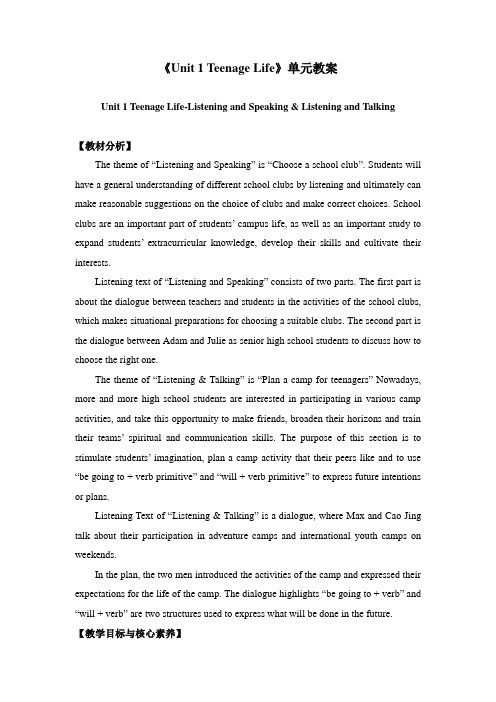
《Unit 1 Teenage Life》单元教案Unit 1 Teenage Life-Listening and Speaking & Listening and Talking【教材分析】The theme of “Listening and Speaking” is “Choose a school club”. Students will have a general understanding of different school clubs by listening and ultimately can make reasonable suggestions on the choice of clubs and make correct choices. School clubs are an important part of students’ campus life, as well as an important study to expand students’extracurricular knowledge, develop their skills and cultivate their interests.Listening text of “Listening and Speaking” consists of two parts. The first part is about the dialogue between teachers and students in the activities of the school clubs, which makes situational preparations for choosing a suitable clubs. The second part is the dialogue between Adam and Julie as senior high school students to discuss how to choose the right one.The theme of “Listening & Talking” is “Plan a camp for teenagers” Nowadays, more and more high school students are interested in participating in various camp activities, and take this opportunity to make friends, broaden their horizons and train their teams’spiritual and communication skills. The purpose of this section is to stimulate students’ imagination, plan a camp activity that their peers like and to use “be going to + verb primitive” and “will + verb primitive” to express future intentions or plans.Listening Text of “Listening & Talking” is a dialogue, where Max and Cao Jing talk about their participation in adventure camps and international youth camps on weekends.In the plan, the two men introduced the activities of the camp and expressed their expectations for the life of the camp. The dialogue highlights “be going to + verb” and “will + verb” are two structures used to express what will be done in the future.【教学目标与核心素养】1. Instruct students to get main facts by listening and motivate them to talk about the topics about how to choose a right school club, how to plan a camp for the future, and how to talk about future activities.2. Develop students’sense of cooperative learning and individual thinking capability.3. Develop students’different listening skills to solve different listening comprehensive problems.4. Help students to understand how to use the structures “be going to do, will do, plan to do, there will be, hope to do” to discuss their future plans and activities.【教学重难点】Prompt Ss to talk about the related topics, such as how to choose a right school club, how to make a camp for the future, how to make a camp plan and how to talk about future activities.【教学过程】Step 1 Listening and SpeakingLead inThe teacher is advised to talk with their students about school clubs that they were in when they were at junior high school: boys and girls, have you ever taken part in any school clubs before and why you chose them? After the small talk, the teacher can move on by finishing the following listening task:Listen to the first two conversations and choose the correct answers.1. What are they learning about in Conversation 1?A. Hearing.B. Sounds.C. Dogs.2. The students are discussing in Conversation 2.A. schoolworkB. relationshipsC. dating3. Circle the two clubs where these two conversations happened.A. Science ClubB. Ballet ClubC. Nature ClubD. Debate Club.Learning tip:After finishing the task above, the teacher is expected to play Conversation 3 which is about how to help Adam choose a right club and after finishing listening for the first time, the students need to solve the following task.Listen to Conversation 3. Then help Adam choose a club.Tick the activities that happen in each club.Ballet Club○ learn new movements○ make ballet clothes○ watch dance programmesNature Club○ watch biology lectures○ grow plants○ work in a greenhouseCartoon Club○ watch cartoons○ write stories○ draw cartoonsVolunteer Club○ help old people○ clean up parks○ give directionsAfter finishing the task above, the teacher is expected to play Conversation 3 again and solve the following task.1. Adam says that he likes ___________ but is not so interested in___________.2. Which club do you think is suitable for Adam? Why?I think Adam should join the _________Club because he says that he_________.Finally, after finishing the task above, the teacher is expected to instruct students to work in groups to finish the following project:Speaking ProjectWork in pairs. Help each other choose a school club.EXAMPLEA: Hi, Sam! I’ve decided to join the Music Club.B: Good decision!A: How about you? Are you going to join a club?B: Yes. I’m wondering which one I should choose: the Acting Club or the Ballet Club?A: I guess the question is... Do you like dancing better than acting?B: Actually, I like acting better, but my friends go to the Ballet Club and I want to be with them.A: Hmm ... If you ask me, I think you should choose what you like.Pronunciation part1. Have the Ss listen and repeat, then add more words to each group.2. Then listen to the proverbs and repeat. Have the Ss notice the pronunciation of the letters in bold.Step 2 Listening and Talking1. The teacher is advised to talk with their new students about the related topic: Boys and girls, do you know some structures to talk about future activities?Talking about future activitiesWe’ll …I plan to …There’ll be …I hope to …We’re going to …2. After their small talk, the teacher can move on by playing the listening and solve the following task.Underline the expressions in the sentences below Cao Jing and Max use to talk about the future.We’ll learn useful skills.I plan to improve my spoken English.There’ll be students from different schools.I hope to make new friends.We’ll talk about teenage life.I’ll learn to make a fire.There’ll be students from different countries at the camp.There’ll be some experts there to show us how to live in the wild.We’re going to learn about wildlife.I’m going to give a speech.I think I’m going to enjoy the activities.I think we’ll have a lot of fun.3. Work in groups. Plan a youth camp.Teacher make the Ss think of ideas for the camp. And they can use the questions below to get started. And have the Ss present their ideas for a youth camp to the class.●What kind of camp is it?●Who will be there?●What will they do?●Wh at will they learn?EXAMPLE______________campDo you want to have fun and learn at the same time? Then come to our camp. In our camp, you can learn about... There’ll be many interesting activities. First, we are going to... Then we’ll... We also plan to… Finally, we’ll... Please come to our camp!Unit 1 Teenage Life-Reading and Thinking【教材分析】The topic of this unit is about teenage life, which belongs to the theme context of “humans and oneself”.As teenagers who shoulder the responsibility of “Chinese great dream”, they must fully know themselves, including their strengths, weaknesses and challenges etc. They are supposed to improve themselves continuously and readily study their subjects, and thus foster their strategies and confidence in lifelong studies.This period is entitled the freshmen challenges, which mainly concerns some big challenges for new students in Senior high school. In this period, a teacher should lead students to find out what their challenges are and guide them to figure out how to crack the challenges and better themselves. More importantly, a teacher should instruct students to absorb new language points and appreciate the language. Besides, a teacher must instruct students to acquire some skills concerning reading efficiently and inspire them to talk more about their new school life, especially their newproblems and solutions both at school and in life.【教学目标与核心素养】1. Enable students to acquire the basic usage of the new words and expressions concerning the freshmen challenges and learn to use them flexibly.2. Enable students to have a good understanding of the freshmen challenges in the new senior high school which is quite different from junior middle school.3. Develop students’ sense of cooperative learning and individual thinking capability.4. Develop students’ different learning skills to solve different r eading comprehensive problems.【教学重难点】1. Develop students’ reading ability such as skimming, scanning and summarizing.2. Let students talk about their new school challenges in senior high school and encourage them to find the possible solutions to conquer them.【教学过程】1. Warming upStep 1 Leading-inHave a free talk with students. Ask them the following questions:How do you feel about your senior high school? Have you come across some challenges that make you upset?Step 2 Pre-readingLet students guess what the text will be mainly about before reading by looking at the picture and the title.Step 3 Reading1. Fast readingAsk students to skim the reading passage to sum up the main idea of each paragraph and then discuss it with their partners.Paragraph1.________________________________________________2.________________________________________________3.________________________________________________4.________________________________________________Tips: you can find main ideas by first taking at quick look at the title, picture, key words and phrases and topic sentences.2. Intensive readingAllow students to read carefully this time to understand the main details of each paragraph and then finish the following.1. 1. Adam felt __________at the beginning of his senior highA. excitedB. interestedC. confusedD. worried2. Who gave Adam advice on courses?A. Parents.B. Adviser. C .Coach. D. Classmates.3. What subject is Adam's favorite?A. Chinese.B. World history.C. Math.D. English.4. Hearing he was poor in playing football well, AdamA. felt disappointed but went on with itB. left the football and joined a clubC. didn't give up and tried to improveD. felt unhappy but signed up for a new team5. What kind of person is Adam?A. brave and well preparedB. negative and sillyC. active and shyD. gentle and patient2. Let students look through the chart first and then read the text silently. Three minutes later, check the answers with the whole class. Show the suggested answers on the screen.Step 4 Further Reading and discussionRead the text the third time and work in pairs to do the following.1.What does “make the team” in Paragraph 3 mean?2.Do you face the same challenges as Adam? What other challenges areyou facing?3.What are some differences between Adam’s school life and your schoollife?Step 5 Passage ConsolidationComplete the passage with the suitable words from the passage.I'm Adam, 1._______freshman in senior high school. The first week was a little 2. _____ (confuse).There are some 3. _____ (challenge) I have to face in my new school life. First, I had to think carefully about my courses. Chinese is hard to learn, but I hope I can speak it _____ (fluent) when I graduate. My adviser 5. _____ (recommend) me to sign up for advanced literature because I'm good 6. _____it. Second, I had to choose my extra-curricular activities. I tried 7. _____ (join) the school football team though I couldn't do well in 8. _____at first. Besides that, I joined a volunteer club.In order to be well 9. _____ (prepare) for university or whatever else10. _____ (come) in the future, I make up my mind to study harder and get used to new situation.Step 6 Homework1. Write a passage to introduce you first senior school challenges and how to solve them. (about 120words)2. Learn the useful new words and expressions in this part by heart.Unit 1 Teenage Life-Discovering Useful Structure【教材分析】This teaching period mainly deals with the grammar: Phrases.This period carries considerable significance to the cultivation of students’ writing competence and lays a solid foundation for the basic appreciation of language beauty. The teacher is expected to enable students to master this period thoroughly and consolidate the knowledge by doing some exercise of good quality.【教学目标与核心素养】1. Get students to have a good understanding of the basic usages of phrases, including adjective phrases, adverb phrases and noun phrases.2. Enable students to use the basic phrases structures flexibly.3. Develop students’ speaking and cooperating abilities.4. Strengthen students’ great interest in grammar learning.【教学重难点】1. How to enable students to have a good understanding of the basic usages of phrases, including adjective phrases, adverb phrases and noun phrases.2. How to enable students to use the basic usages of phrases flexibly.【教学过程】Step1:语法自主探究读下列例句并感知画线部分的共性。
2020年新人教版高中英语必修一《Unit 4 Natural Disasters》单元教案(附导学案)
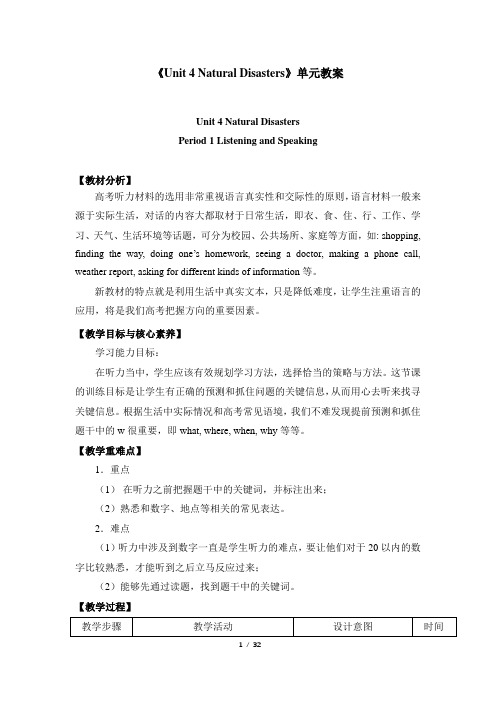
《Unit 4 Natural Disasters》单元教案Unit 4 Natural DisastersPeriod 1 Listening and Speaking【教材分析】高考听力材料的选用非常重视语言真实性和交际性的原则,语言材料一般来源于实际生活,对话的内容大都取材于日常生活,即衣、食、住、行、工作、学习、天气、生活环境等话题,可分为校园、公共场所、家庭等方面,如: shopping, finding the way, doing one’s homework, seeing a doctor, making a phone call, weather report, asking for different kinds of information等。
新教材的特点就是利用生活中真实文本,只是降低难度,让学生注重语言的应用,将是我们高考把握方向的重要因素。
【教学目标与核心素养】学习能力目标:在听力当中,学生应该有效规划学习方法,选择恰当的策略与方法。
这节课的训练目标是让学生有正确的预测和抓住问题的关键信息,从而用心去听来找寻关键信息。
根据生活中实际情况和高考常见语境,我们不难发现提前预测和抓住题干中的w很重要,即what, where, when, why等等。
【教学重难点】1.重点(1)在听力之前把握题干中的关键词,并标注出来;(2)熟悉和数字、地点等相关的常见表达。
2.难点(1)听力中涉及到数字一直是学生听力的难点,要让他们对于20以内的数字比较熟悉,才能听到之后立马反应过来;(2)能够先通过读题,找到题干中的关键词。
【教学过程】Unit 4 Natural Disasters—Reading & Thinking【教学目标与核心素养】1. Teach students to find out the paragraph topic sentences, understand the basic information of the Tangshan earthquake through skimming, searching and other reading skills.2. Enable students to sort out the details of the paragraph, to understand the strange things before the Tangshan earthquake, the tremendous destructive force caused by the earthquake, and the rapid and selfless rescue and reconstruction after the disaster.3. Discuss the thinking brought by earthquake and sublimate the theme significance.【教学重难点】1. Develop students’ reading ability such as skimming, scanning and summarizing.2. Let students talk about the precursor before the earthquake, the damage caused by the earthquake, the rescue after the earthquake and the reconstruction after the earthquake.【教学过程】Step 1 Activity 1 Activating background informationT: Today we are going to learn a passage with the title “The Night the Earth Didn’t Sleep”. So why didn’t the earth sleep on that night? Wh at happened to the earth? Actually there is a movie directed by Feng Xiaogang focuses on the same earthquake. Now, I’d like to show you a short clip of the movie.1. Talk about the earthquakeQ1. What do you learn from the video?2. Talk about Tangshan earthquake.Q1. What do you know about Tangshan earthquake?Q2. What do you want to know about it?Step 2 Activity 2 Reading to get some basic information about earthquake1. Read quickly to find the answers to the students’ own questions.2. Read for the topic sentences and work out the organization of the text.Q1 What’s the topic sentence in each paragraph?Q2 In what order does the author describe the earthquake?Step 3 Activity 3 Reading for detailed information1. Read to get detailed information about Paragraph 1.Q1: What were the strange things?Q2: What was people’s reaction to these strange things?Q3. Why didn’t people pay attention to these strange things/the signs before the earthquake?T: People had little knowledge of earthquake at that time.Q4 When does this paragraph mainly talk about?T: Abnormal signs before the earthquake.2. Read to get detailed information about Paragraph 2.Q1 How strong was the earthquake?Q2 How did the people feel when the earthquake happened?Q3 What does this paragraph mainly talk about?3. Read to get detailed information about Para. 3.Q1 What were destroyed?Q2 How does the writer describe “everything in the city”?Q3 How did the people feel?Q4 What does this paragraph mainly talk about?4. Read to get detailed information about Paragraph 4.Q1. Who brought hope back? And what did they do?Q2. How did the people feel after a lot of people came to rescue?Q3. How was the city after a lot of people came to rescue?5. Read to get detailed information about Paragraph 5.Q1. What shows the revival of Tangshan?Q2. How can Tangshan revive itself and get up on its feet again?Q3. In times of disasters, how can we go through it?T: In times of disasters, we should unify, show the wisdom and stay positive.Step 4 Activity 4 Highlighting the theme and reflecting1. Make a summary of the text.Q: After our learning, why do you think the earth didn’t sleep on that night?T: An earthquake happened. The people in the earthquake suffered a lot, and the people outside Tangshan were concerned about the people there a lot.3. Reflect through discussion on what can be learnt after reading.T: Disasters are powerful. Unpreparedness can be deadly. Life is weak, but if people work together to help each other, disasters can be defeated.There is no love from disaster, but we have love in the human heart.Step 5 AssignmentHow does the writer convey that the earthquake was deadly, and that people were helpless during the earthquake? Try to find some attractive and impressive expressions and note them down.Unit 4 Natural DisastersPeriod 3 Discovering Useful Structures【教材分析】This teaching period mainly deals with the grammar: the restrictive relative clauses.This period carries considerable significance to the cultivation of students’ writing competence and lays a solid foundation for the basic appreciation of language beauty. The teacher is expected to enable students to master this period thoroughlyand consolidate the knowledge by doing some exercise of good quality.【教学目标与核心素养】1. Get students to have a good understanding of the basic usages of the restrictive relative clauses.2. Enable students to use the restrictive relative clauses flexibly.3. Develop students’ speaking and cooperating abilities.4. Strengthen students’ great interest in grammar learning.【教学重难点】How to enable students to have a good understanding of the restrictive relative clauses, especially the uses of the relative words such as which, that, who, whom. 【教学过程】Step1: 语法知识呈现定语从句(一)—关系代词的用法在复合句中, 修饰名词或代词的从句叫定语从句。
人教版高中英语必修一全套教案
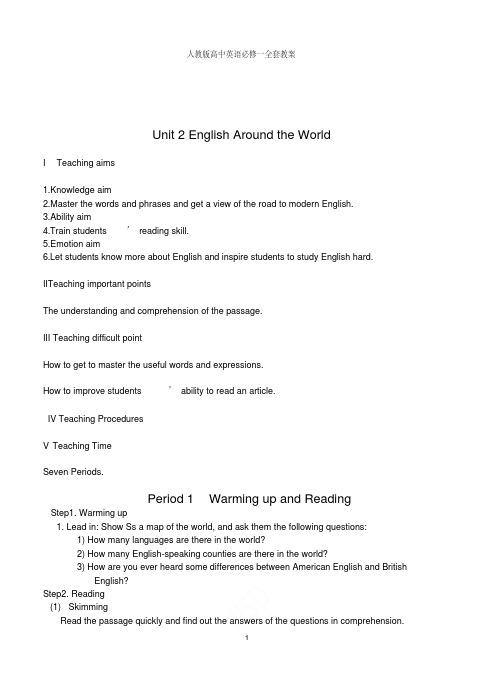
Unit 2 English Around the WorldI Teaching aims1.Knowledge aim2.Master the words and phrases and get a view of the road to modern English.3.Ability aim4.Train students’ reading skill.5.Emotion aim6.Let students know more about English and inspire students to study English hard. IITeaching important pointsThe understanding and comprehension of the passage.III Teaching difficult pointHow to get to master the useful words and expressions.How to improve students’ ability to read an article.IV Teaching ProceduresV Teaching TimeSeven Periods.Period 1 Warming up and ReadingStep1. Warming up1. Lead in: Show Ss a map of the world, and ask them the following questions:1) How many languages are there in the world?2) How many English-speaking counties are there in the world?3) How are you ever heard some differences between American English and BritishEnglish?Step2. Reading(1)SkimmingRead the passage quickly and find out the answers of the questions in comprehension.(2)ScanningThe cause Cultures communicate with one another Time Things that happenedBetween AD450 and 1150Based on German1150 to 1500 Less like German; more like FrenchIn the 1600’sShakespeare broadened the vocabulary A bigchanged in EnglishLater British people broughtEnglish to Australia(3)Listen to the tape and tell the meaning of each paragraph.1. Para1: Brief introduction of the change in English.2. Para.2: An example of different kinds of English.3. Para3: The development of English.Para4: English spoken in some other countries.(4)Post readingStep3. DiscussionSome people say that Chinese is a much more elegant language, so it is more important for us to master it and it is not so necessary to master foreign language. Do you agree with this opinion and why?Period 2 Language pointsLanguage points:1. Do you know that there is more than one kind of English in the world?你知道世界上英语的种类并不止一种吗?more than one +名词单数,后面的谓语动词用单数例如:More than one student wants to go to swim.2.In some important ways they are very different form one another.在某些重要的方面,它们彼此有些差异。
2020年新人教版高中英语必修一...
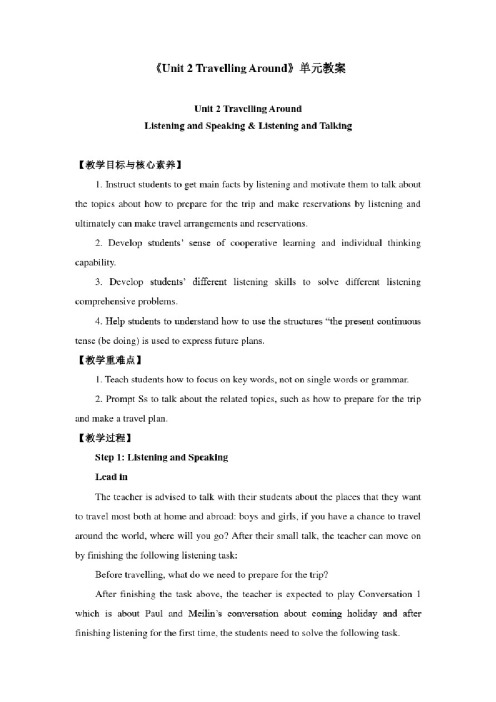
Wnit2Travelling Around^单元教案Unit2Travelling AroundListening and Speaking&Listening and Talking【教学目标与核心素养】1.Instinct students to get main facts by listening and motivate them to talk about the topics about how to prepare for the trip and make reservations by listening and ultimately can make travel arrangements and reservations.2.Develop students'sense of cooperative learning and individual thinking capability.3.Develop students'difierent listening skills to solve different listening comprehensive problems.4.Help students to understand how to use the stinctures“the present continuous tense(be doing)is used to express future plans.【教学重难点】1.Teach students how to focus on key words,not on single words or grammar.2.Prompt Ss to talk about the related topics,such as how to prepare for the trip and make a travel plan.【教学过程】Step1: Listening and SpeakingLead inThe teacher is advised to talk with their students about the places that they want (o travel most both at home and abroad:boys and girls, if you have a chance to travel around the world,where will you go?After their small talk,the teacher can move on by finishing the following listening task:Before travelling,what do we need to prepare for the trip?After finishing the task above,the teacher is expected to play Conversation1 which is about Paul and Meiliii s conversation about coming hoEday and after finishing listening for the first time,the students need to solve the following task.1.Circle the two places Meilin is going to for holiday.A.Germany.B・ England. C.Iceland. D.France.2.How is she going to get there?A.By sea.B.By air.C.By train.3How is she planning to get around after she arrives?A.By car.B.By train.C.On foot.Listening tip:Focus on key words:Do not try to catch every word in a conversation.Instead,listen for key words and phrases.You should focus on getting the main idea,not on single words or grammar.After finishing the task above,the teacher is expected to play Conversation 2 which is about where and why Paul is visiting with his family and after finishing listening,the students need to solve the following task.Listen to Conversation2.Then answer the following questions:1.Where is Paul's family going over the holiday?2,Why are they going there?After finishing the task above,the teacher is expected to play Conversation 3 which contains the whole conversation and solve the following task.Fill in the table below:Travel preparationsMeilin PaulGet her passport-________________________a few light•__________________for her visa sweaters and a coat-__________________air tickets online-________________________a guidebook•__________________a carFinally,after finishing the task above,the teacher is expected to instruct students to work in groups to finish the following project:Speaking ProjectTalking projectOpening can I K c I d vou?_____________________fo buy a plane are youticket -On the 23rd of December.Talking about timetravelling?There are two flights _Which _____________________?The 9:30 flight please.Talking about Would _____________________travelto travelwhat you preferbusiness class or economy?book a returnbusiness class.Na _____________________■ I'm takingflight this time?the train back.Other information _____________________your name, sir?Robert Williams.Paymentto pay?By ertdi* card.Work in groups.Imagine you are making plans for the holiday. Choose one of the situationsbelow and role-play a phone call with a partner.Unit 2 Travelling Around-Listening and Speaking教材分析This teaching period mainly deals with listening and speaking.Students are expected to learn how to listen to people who discuss theirplans and know some pronunciation skills. The teachers are expected toenable students to master some listening and speaking skills.教学目标Knowledge objectives: Enable students to acquire the basic usage of somewords and phrases.Skill objectives: Enable students to have a good understanding of listeningskills.Emotional objectives:Develop students'sense of cooperative learning and individual capability.Tliiiikiiig quality objectives:Inspire students*spirit of patriotism.教学重难点Listen to people who discuss their travel plans.Grasp some listening skills and the rules of pronunciation.教学过程教学环节教师活动学生活动设计意图导入新课J1J)•彳Step1Lead inL Where have you travelled?Lijiun^Beijing,shanghai.Xhijiung・If you have the chance to travel abroad.vhat do you need to do prepare for the travel?Get a passportBook ticketsRent a carPack some clothesApply f or a visaBook u hotel roomBuy a guidebookResearch the local weatherReview:some words about travellingifeif journey,trip掖游tour报游者tourist快行路线routeH境游outbound tourism;outbound travel背包旅行者backpacker自由行free walker住返旅行return journey;round trip以小组为单位鼓励学生讨论。
人教版高中英语必修1全册教案
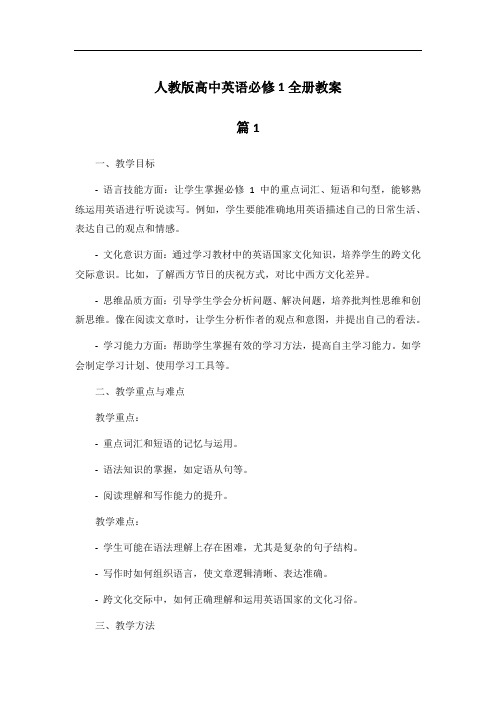
人教版高中英语必修1全册教案篇1一、教学目标-语言技能方面:让学生掌握必修1 中的重点词汇、短语和句型,能够熟练运用英语进行听说读写。
例如,学生要能准确地用英语描述自己的日常生活、表达自己的观点和情感。
-文化意识方面:通过学习教材中的英语国家文化知识,培养学生的跨文化交际意识。
比如,了解西方节日的庆祝方式,对比中西方文化差异。
-思维品质方面:引导学生学会分析问题、解决问题,培养批判性思维和创新思维。
像在阅读文章时,让学生分析作者的观点和意图,并提出自己的看法。
-学习能力方面:帮助学生掌握有效的学习方法,提高自主学习能力。
如学会制定学习计划、使用学习工具等。
二、教学重点与难点教学重点:-重点词汇和短语的记忆与运用。
-语法知识的掌握,如定语从句等。
-阅读理解和写作能力的提升。
教学难点:-学生可能在语法理解上存在困难,尤其是复杂的句子结构。
-写作时如何组织语言,使文章逻辑清晰、表达准确。
-跨文化交际中,如何正确理解和运用英语国家的文化习俗。
三、教学方法-情景教学法:创设各种真实的情景,让学生在情景中学习英语。
比如,模拟超市购物的场景,让学生用英语进行交流。
-任务驱动法:给学生布置具体的任务,让他们在完成任务的过程中学习英语。
例如,让学生分组制作英语手抄报,介绍自己喜欢的英语电影。
-合作学习法:组织学生进行小组合作学习,培养他们的团队合作精神和交流能力。
如小组讨论英语课文中的问题,共同完成作业。
四、教学过程(一)精彩导入师:“同学们,咱们今天先来放松一下,看一段超精彩的英文电影片段。
”说完,我打开多媒体设备,播放电影《阿甘正传》的一个片段,这个片段里有很多经典的英文台词。
同学们都被电影吸引住了,看得特别认真。
等片段播放完,师:“怎么样,同学们,这段电影好看不?”同学们纷纷点头回应。
师:“那大家有没有注意到里面的一些英文表达呀?比如说‘Life was like a box of chocolates, you never know what you're gonna get.’这句话,是不是很有感觉呢?其实呀,在我们今天要学的人教版高中英语必修 1 里,也有很多这样精彩的表达哦。
